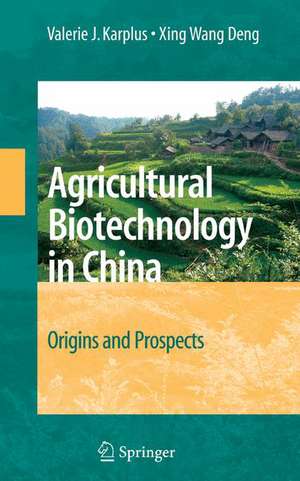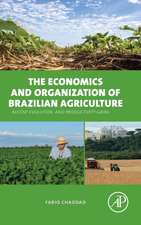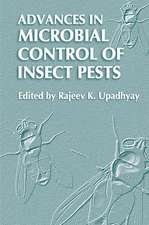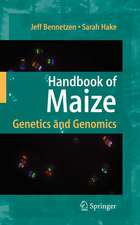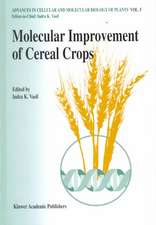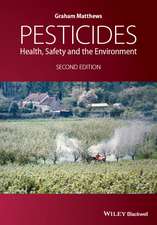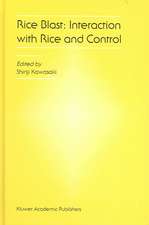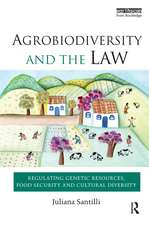Agricultural Biotechnology in China: Origins and Prospects
Autor Valerie J. Karplus, Xing Wang Dengen Limba Engleză Hardback – 17 dec 2007
The authors begin by describing the origins of China’s earliest agrarian civilizations and how agricultural technology historically contributed to the emergence, rise, and fall of states and dynasties. The book then focuses on how post-industrial advances in chemistry and biology led to the development of technologies (including high-yielding seeds, pesticides, and fertilizers) that ushered in a period of expanding global harvests in the mid-20th Century known as the Green Revolution.The political, economic, and social factors that influenced the patterns of adoption as well as the successes and shortcomings of Green Revolution technologies in China are then explored in detail.
The authors then introduce transgenic crops — the origins, tools and techniques, and initial patterns of market acceptance or rejection worldwide — describe in depth why, where, and how research on transgenic crops first began in China. This section evaluates the effectiveness of policies that promoted science and technology development as part of the post-1978 reform agenda, and suggests why support for agricultural biotechnology—and transgenic crops in particular—was included alongside land and market reforms. The authors move on to questions related to adoption of transgenic crops in China, looking first at how structural changes in the seed industry and the introduction of value-added varieties are changing age-old relationships between farmers and seed providers. In the final chapters, the authors present how well suited transgenic crops may be to meeting persistent and emerging challenges facing China’s agricultural sector today.
| Toate formatele și edițiile | Preț | Express |
|---|---|---|
| Paperback (1) | 635.31 lei 43-57 zile | |
| Springer – 23 aug 2016 | 635.31 lei 43-57 zile | |
| Hardback (1) | 641.03 lei 43-57 zile | |
| Springer – 17 dec 2007 | 641.03 lei 43-57 zile |
Preț: 641.03 lei
Preț vechi: 754.15 lei
-15% Nou
Puncte Express: 962
Preț estimativ în valută:
122.67€ • 127.30$ • 102.54£
122.67€ • 127.30$ • 102.54£
Carte tipărită la comandă
Livrare economică 17-31 martie
Preluare comenzi: 021 569.72.76
Specificații
ISBN-13: 9780387711386
ISBN-10: 0387711384
Pagini: 165
Ilustrații: XXIII, 165 p.
Dimensiuni: 155 x 235 x 15 mm
Greutate: 0.44 kg
Ediția:2008
Editura: Springer
Colecția Springer
Locul publicării:New York, NY, United States
ISBN-10: 0387711384
Pagini: 165
Ilustrații: XXIII, 165 p.
Dimensiuni: 155 x 235 x 15 mm
Greutate: 0.44 kg
Ediția:2008
Editura: Springer
Colecția Springer
Locul publicării:New York, NY, United States
Public țintă
ResearchCuprins
From Seeds to Empires: China’s Long Agricultural History.- Modern Science on the Farm: The Green Revolution.- Transformation in China’s Agriculture in the Twentieth Century.- Agricultural Biotechnology: New Tools for Ancient Practices.- Agricultural Biotechnology Takes Root in China.- From Lab to Field: A Changing Seed Delivery~System.- China’s First Transgenic Crops: Farm Level Impact.- Biosafety and China’s Regulatory Policy.- Looking to the Future: Trends in Research and Rural Development Agendas.- Conclusion.
Recenzii
"Karplus and Deng provide an excellent account of how developments in agricultural biotechnology may be the next big step in a long tradition of agricultural advances. I commend them for this outstanding piece of scholarship."
Dr. Norman E. Borlaug, Nobel Peace Prize Laureate
"The book is well written and can be easily understood by intelligent laymen who are interested in this subject. The book not only carefully documents the events, but also includes an astute analysis of the strengths and weaknesses of the system."
Dr. Ray Wu, Professor of Molecular Biology and Genetics, Cornell University
"This book documents the rapid rise in crop biotechnology R&D capacity in China over the past thirty years and helps illuminate a policy conundrum Chinese leaders currently face. As the authors indicate, China’s success in finding the right balance between public and private priorities may well influence policies concerning agricultural biotechnology across much of the developing world."
Dr. Gary Toenniessen, The Rockefeller Foundation
"This book is a valuable contribution to the literature on the role of science in developing countries. The authors have done an excellent job of describing agricultural biotechnology in laymen's terms, presenting interviews with the scientists who developed the technology, and then describing the impact of technology based on the latest scholarly evidence. In addition, it has a well-balanced presentation of the current Chinese policy debates on biosafety regulation. I will definitely use it in my science policy and economic development courses in the future."
Dr. Carl E. Pray, Professor of Agriculture, Food, and Resource Economics, Rutgers University
Dr. Norman E. Borlaug, Nobel Peace Prize Laureate
"The book is well written and can be easily understood by intelligent laymen who are interested in this subject. The book not only carefully documents the events, but also includes an astute analysis of the strengths and weaknesses of the system."
Dr. Ray Wu, Professor of Molecular Biology and Genetics, Cornell University
"This book documents the rapid rise in crop biotechnology R&D capacity in China over the past thirty years and helps illuminate a policy conundrum Chinese leaders currently face. As the authors indicate, China’s success in finding the right balance between public and private priorities may well influence policies concerning agricultural biotechnology across much of the developing world."
Dr. Gary Toenniessen, The Rockefeller Foundation
"This book is a valuable contribution to the literature on the role of science in developing countries. The authors have done an excellent job of describing agricultural biotechnology in laymen's terms, presenting interviews with the scientists who developed the technology, and then describing the impact of technology based on the latest scholarly evidence. In addition, it has a well-balanced presentation of the current Chinese policy debates on biosafety regulation. I will definitely use it in my science policy and economic development courses in the future."
Dr. Carl E. Pray, Professor of Agriculture, Food, and Resource Economics, Rutgers University
Notă biografică
Valerie J. Karplus graduated from Yale University in 2002 with a Bachelor of Science degree in Molecular Biophysics and Biochemistry and Political Science. She lived in China for two years, where she researched the development and impact of agricultural biotechnology in China while based at the China Agricultural University (2002-2003) and National Institute of Biological Sciences, Beijing (2005-2006). Currently she is pursuing graduate study at the Massachusetts Institute of Technology.
Dr. Xing Wang Deng is the Daniel C. Eaton Professor of Plant Biology at Yale University. His scientific work focuses on the molecular and genomic basis for plant development and agricultural biotechnology. He also serves as the co-director of the National Institute of Biological Sciences, Beijing and the founding director of the Peking-Yale Joint Research Center of Plant Molecular Genetics and Agro-biotechnology. He has led a research team that has published well over a hundred peer-reviewed articles in his area of research.
Dr. Xing Wang Deng is the Daniel C. Eaton Professor of Plant Biology at Yale University. His scientific work focuses on the molecular and genomic basis for plant development and agricultural biotechnology. He also serves as the co-director of the National Institute of Biological Sciences, Beijing and the founding director of the Peking-Yale Joint Research Center of Plant Molecular Genetics and Agro-biotechnology. He has led a research team that has published well over a hundred peer-reviewed articles in his area of research.
Textul de pe ultima copertă
Over the last thirty years, China has developed one of the world’s largest public research programs in agricultural biotechnology. Building on a long tradition of agricultural advances, Chinese scientists have applied biotechnology techniques to develop hundreds of novel crop varieties suited to local farming conditions and challenges.
Agricultural Biotechnology in China: Origins and Prospects is a comprehensive examination of how the origins of biotechnology research agendas, along with the effectiveness of the seed delivery system and biosafety oversight, help to explain current patterns of crop development and adoption in China. Based on firsthand insights from China’s laboratories and farms, Valerie Karplus and Dr. Xing Wang Deng explore the implications of China’s investment for the nation’s rural development, environmental footprint, as well as its global scientific and economic competitiveness.
About the Authors
Valerie J. Karplus graduated from Yale University in 2002 with a Bachelor of Science degree in Molecular Biophysics and Biochemistry and Political Science. She lived in China for two years, where she researched the development and impact of agricultural biotechnology in China while based at the China Agricultural University (2002-2003) and National Institute of Biological Sciences, Beijing (2005-2006). Currently she is pursuing graduate study at the Massachusetts Institute of Technology.
Dr. Xing Wang Deng is the Daniel C. Eaton Professor of Plant Biology at Yale University. His scientific work focuses on the molecular and genomic basis for plant development and agricultural biotechnology. He also serves as the co-director of the National Institute of Biological Sciences, Beijing and the founding director of the Peking-Yale Joint Research Center of Plant Molecular Genetics and Agro-biotechnology. He leads a research team that haspublished well over a hundred peer-reviewed articles in his area of research.
Agricultural Biotechnology in China: Origins and Prospects is a comprehensive examination of how the origins of biotechnology research agendas, along with the effectiveness of the seed delivery system and biosafety oversight, help to explain current patterns of crop development and adoption in China. Based on firsthand insights from China’s laboratories and farms, Valerie Karplus and Dr. Xing Wang Deng explore the implications of China’s investment for the nation’s rural development, environmental footprint, as well as its global scientific and economic competitiveness.
About the Authors
Valerie J. Karplus graduated from Yale University in 2002 with a Bachelor of Science degree in Molecular Biophysics and Biochemistry and Political Science. She lived in China for two years, where she researched the development and impact of agricultural biotechnology in China while based at the China Agricultural University (2002-2003) and National Institute of Biological Sciences, Beijing (2005-2006). Currently she is pursuing graduate study at the Massachusetts Institute of Technology.
Dr. Xing Wang Deng is the Daniel C. Eaton Professor of Plant Biology at Yale University. His scientific work focuses on the molecular and genomic basis for plant development and agricultural biotechnology. He also serves as the co-director of the National Institute of Biological Sciences, Beijing and the founding director of the Peking-Yale Joint Research Center of Plant Molecular Genetics and Agro-biotechnology. He leads a research team that haspublished well over a hundred peer-reviewed articles in his area of research.
Caracteristici
Focuses in depth on the historical, political, and sociological context that led to the development of transgenic crops in China Takes a thorough look at the rationale behind biotechnology development in China Evaluates the current and potential prospects of biotechnology development to alleviate China’s agricultural challenges and how the lessons may apply to the rest of the world Translation into Chinese will be prepared by authors and be available within a few months in the Chinese market
